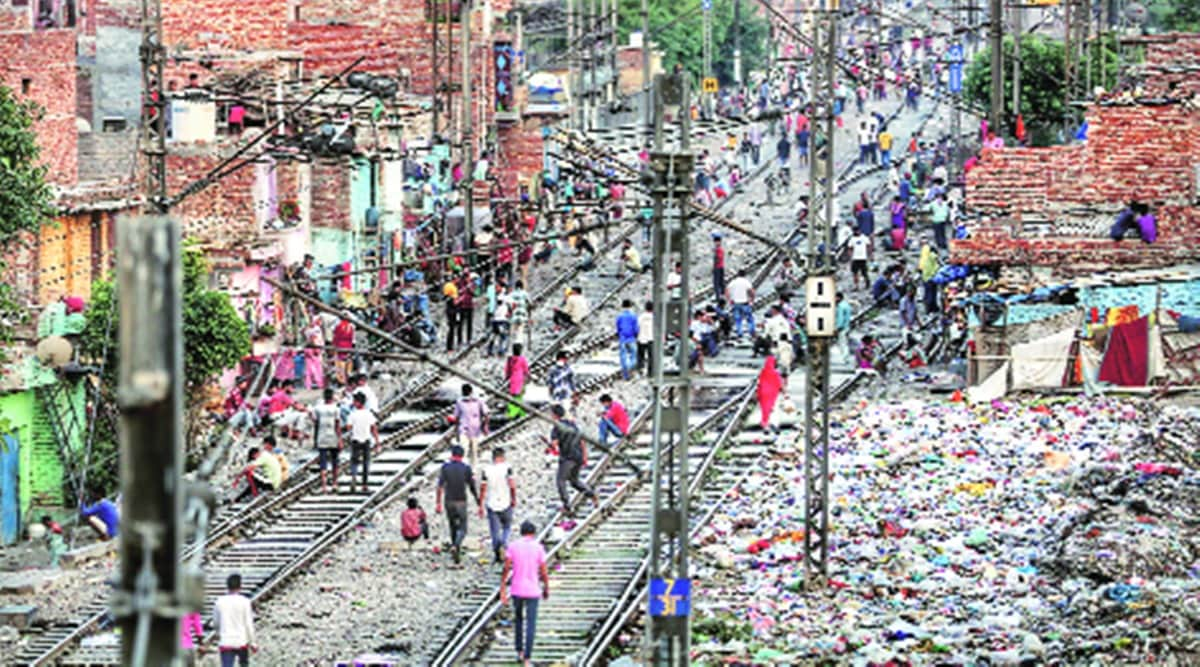 A Supreme Court order has said that 48,000 jhuggis along railway lines in Delhi have to be demolished. (Photo by Tashi Tobgyal)
A Supreme Court order has said that 48,000 jhuggis along railway lines in Delhi have to be demolished. (Photo by Tashi Tobgyal)The Delhi government has told Northern Railway that demolishing jhuggis along tracks would be illegal and that houses built for slum relocation can be made “ready to move in” earliest by March next year.
A complex in Sultanpuri, which has 1,060 flats, can be made available by December 2020, it said, but it is being used as a Covid care centre at present.
The letter was written by officials of the Delhi Urban Shelter Improvement Board (DUSIB) after the CM held a meeting with senior officials from different departments to discuss the Supreme Court order, which said that 48,000 jhuggis along railway lines in Delhi have to be demolished. The apex court also ordered that jhuggis which are in the safety zone of the railways will have to be removed within three months. As reported by The Indian Express, this has left residents in the lurch.
“Encroachments in the safety zones should be removed within three months and no interference, political or otherwise, should be there and no Court shall grant any stay with respect to removal of the encroachments in the area in question,” SC said.
The letter said that present rules state that jhuggis built prior to January 2006 cannot be demolished without providing alternate living arrangements to residents. Northern Railway spokesperson said he had not seen the letter and would respond only after he has studied it.
AAP MLA Raghav Chadha, meanwhile, said Friday that pasting notices for eviction and demolition outside jhuggis was illegal and that the Railways had filed an affidavit in court which said that political interference was coming in the way of demolition.
“The matter in court was regarding cleanliness. The Railways has filed an affidavit saying there were constraints — stay orders and political interventions — in removing slums… We will not let this happen. Without giving options for rehabilitation, this action is illegal. Arvind Kejriwal will not allow this to happen,” he said.
Congress leader Ajay Maken also moved the Supreme Court against the direction and said that demolition notices issued by authorities have “circumvented the established procedure” with respect to rehabilitation of slum dwellers. Maken had earlier gone to court against eviction of slum dwellers in Shakurbasti, where the court last year called for a survey to identify those eligible for rehabilitation and arrangements for relocation, before carrying out evictions.
That judgment has also been quoted in Delhi government’s letter to Northern Railway. “The Delhi government was a party in the case. The 2019 judgment in the Maken versus Government of India case was accepted by all parties, including the Railways. These points were not raised in the SC. The Delhi government didn’t even file an appeal in court against the order,” said Congress’s Aman Panwar, who filed the petition on behalf of Maken.
In the letter, the government has also informed railway authorities that to shift people from jhuggis to apartments, they will have to pay DUSIB between Rs 7.55 lakh to Rs 11.30 lakh per flat.
At present, flats have been constructed in 11 areas, containing 29,257 houses, to relocate slum dwellers. However, they are not in a liveable condition. Another 16,600 flats are under construction. These flats were constructed between 2007 and 2019 under the Jawaharlal Nehru National Urban Renewal Mission.
“If Railways is ready to pay us the amount, we are ready to shift people there shortly. The relocation policy has been adopted in Delhi and it has to be followed before jhuggis are demolished,” said Bipin Rai, member, DUSIB.